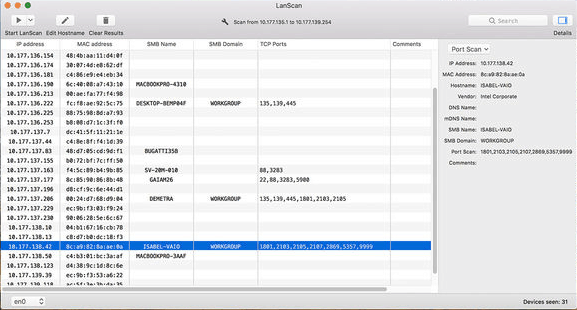

If the IP address listed in the alert is known to you and the traffic is okay, you can add the IP address to the reconnaissance allow list: The alert may be caused by a scan that is not malicious.Then, you can try one of these suggested actions: When you receive a Reconnaissance Detected alert, double-click it to display more detailed information, including the IP address that is performing the scan. TCP Xmas Scan: The agent or appliance detects packets with only the FIN, URG, and PSH flags set or a value of 0xFF (every possible flag set).TCP SYNFIN Scan: The agent or appliance detects packets with only the SYN and FIN flags set.TCP Null Scan: The agent or appliance detects packages with no flags set.

The statistical analysis method used in computer or port scan detection is derived from the "TAPS" algorithm proposed in the paper "Connectionless Port Scan Detection on the Backbone" presented at IPCCC in 2006. Normally, an agent or appliance computer will only see traffic destined for itself, so a port scan is the most common type of probe that will be detected. Network or Port Scan: The agent or appliance reports a network or port scan if it detects that a remote IP is visiting an abnormal ratio of IPs to ports.Computer OS Fingerprint Probe: The agent or appliance detects an attempt to discover the computer's OS.

Types of reconnaissance scansĭeep Security can detect several types of reconnaissance scans:
#Osx port scan pro
Not sure what you mean by dark side of the in-app purchase, both LanScan+In-App and LanScan Pro had the same features since we started to code both app when in-app didn't exist.The reconnaissance scan detection feature serves as an early warning of a potential attack or intelligence gathering effort against a network. Hey xTexLutz ! Thanks for your kind words. It appears Debookee-team has gone to the dark-side? Sadly. (What gives me pause: the "pro" version has been discontinued and now they proudly proclaim that future updates will follow the in-app-purchase model. It's naming "discovery" is not as good as others (you end up having to add nearly every Hostname manually) but once that is done, it's fast and reliable.

#Osx port scan free
> Only few TCP ports are displayed in free versionĪfter suffering through the greedy "IP scan basic/home/pro" bait and switch of a competitor, I am pleased to say that LanScan is a fine reliable product. > Only 4 hostnames are fully displayed -> You'll see the first 3 chars of the others Restrictions in free version compared to Pro in-app purchase: > No limitation on the number of devices found ! > Hostname resolution: DNS, mDNS (Apple devices) and SMB (Windows devices) > Discover the SMB domain if any configured
#Osx port scan mac
> Display the IP address, MAC address, hostname (4 max) and vendor associated > Scan public IP network ranges with Ping / SMB / mDNS packets > Scan your local network with ARP packets > Scan the IP range you like, from 1 IP to the whole IPv4 address space! > Auto-detection of configured interfaces: Airport, Ethernet, Virtual interfaces. LanScan is a simple and efficient IPv4 network scanner that discovers all active devices on any subnet: the local one, or any public subnet that you configure.


 0 kommentar(er)
0 kommentar(er)
